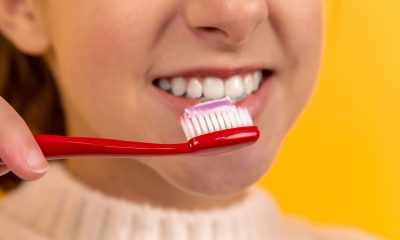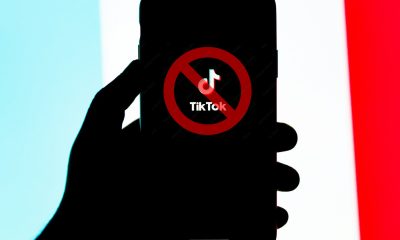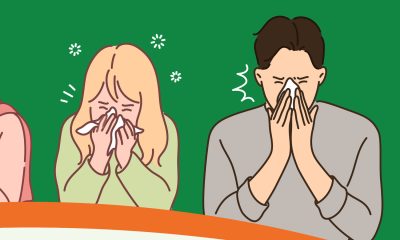A third of parents believe their kids should be punished if they vape
“Most parents recognize the health risks of vaping and feel their child does too."
Published
1 year ago onBy
Talker NewsBy Pol Allingham via SWNS
A third of parents believe their kids should be punished with community services for vaping, a study revealed.
But researchers said parents had "unrealistic" expectations on whether their kids vaped with almost half claiming they would know.
Though very few thought their own child was a vapor, many favored extreme reprisals if they were caught.
Dr. Sarah Clark, University of Michigan, said: “Very few parents believe their child is vaping, but they may not have a realistic view about their child’s exposure or experiences with e-cigarettes.
“Most parents recognize the health risks of vaping and feel their child does too.
“However, it’s important for parents to understand that the part of the brain that connects emotions to judgment is still developing for adolescents and teens and they may not consider long-term health effects in their daily actions.
“Based on national data about vaping prevalence among middle and high schoolers, many parents may be unaware that their child has tried it."
Some parents even felt their vaping children should be put on probation, according to the study from the University of Michigan.
Many moms, dads and guardians who didn’t back legal consequences believed kids should be severely punished by the school - half thought young people caught with a vape should be suspended.
Opinions on consequences were split, however, and 10 percent felt no punishment was necessary. Meanwhile, 20 percent said a warning would suffice.
Overall, 66 percent of parents felt children should be held responsible for vaping, while just over 50 percent believe the sellers should face the consequences, and only 40 percent said parents should take the blame.
Vaping remains a burgeoning industry, and, despite warnings, the colorful stop-smoking tools are increasingly popular among kids.
In 2022, the Centers for Disease Control and Prevention’s National Youth Tobacco Survey revealed about three percent of middle schoolers and 14 percent of high school students claimed they vaped in the past 30 days.
Increasingly, vapes are designed to be easy to conceal - products may resemble everyday items such as USB drives, pens, smartphone cases and smartwatches.
Inventors even created hoodies hiding a vape in the drawstring.
Concealing a puff is simple even in indoor areas like bathrooms and classrooms.
Today, youths could ditch them in a bin before they run into mom, dad, or a teacher.
Yet most parents insisted they would “definitely or probably” know - 67 percent thought their children would tell them, 57 percent believed they would find vaping supplies in their belongings, and 37 percent suspected they would be tipped off by others.
Dr. Clark added: “Devices can look like common objects that parents might not immediately recognize.
“Disposable vapes are becoming more popular and can be thrown away before teens are around parents or teachers. Vaping doesn’t have the telltale odor of traditional cigarettes.
“All this makes vaping harder to detect and easier to hide than some parents may realize.
“Although parents generally felt adolescents should be held responsible if they are caught vaping, they disagreed about the severity of consequences they would support.
“This variability in parent opinions may make it difficult for school and community officials to enact vaping policies that include clear and consistent consequences.”
When it came to recommending punishment for adults over kids, three-quarters believe heavier enforcement of laws against dealing vapes to minors could reduce children and teens picking up e-cigarettes.
Upping tax on vapes was favored by 57 percent, 52 percent suggested limiting vape advertising on social media, and 30 percent thought requiring warning labels on packaging would help.
Originally e-cigarettes were marketed as a healthy alternative to tobacco.
Despite the majority of parents recognizing vaping is addictive, 10 percent think vaping is less damaging for their health than cigarettes, and 16 percent would rather their child vape than drink alcohol or use drugs.
However, Dr. Clark warned it is not entirely safe. Chronic bronchitis, exacerbated asthma, swelling and irritation of the lungs are all risks.
Over time, puffing can cause significant lung damage and nicotine addiction can be hard to break and bring symptoms of withdrawal.
Further risks are taken on when kids pack the devices with substances like marijuana and other drugs.
A key warning sign of excessive vaping is a dry mouth or dehydration, which could increase thirst and create dark under-eye circles. This is due to an abundant chemical in the e-liquid, propylene glycol.
The expert said: “Vaping can be dangerous for teens because they are using nicotine and that can become addictive and damaging to their health.
“Whether or not you think your child is vaping or whether they understand health risks, it’s helpful to initiate conversations to talk to them about it.
“This should be an ongoing conversation allowing parents to gauge their child’s knowledge and experiences with vaping, talk about health risks and give kids opportunities to share information and ask questions.
“In a non-judgmental way, parents can explain why they think vaping is unhealthy. If their child is vaping, parents should work with their child to learn about strategies to quit, consulting the child’s healthcare provider if necessary.
“Parents should try to understand their child’s risk of exposure to vaping among friend circles and in the community and also how their schools enforce vaping rules.
“In order to help your kids, you need to educate yourself about how vaping works and how to detect it.”
She added in the report published in the journal Michigan Medicine parents may want to visit petrol stations to check out packaging and costs.
Checking out whether vaping is common in the community might also be useful, and asking the school about vape education is offered.
Results were gathered by polling 1,325 parents with at least one child aged 11-18.
Stories and infographics by ‘Talker Research’ are available to download & ready to use. Stories and videos by ‘Talker News’ are managed by SWNS. To license content for editorial or commercial use and to see the full scope of SWNS content, please email [email protected] or submit an inquiry via our contact form.
You may like


Egg-laying mammal missing over 60 years photographed for first time in history


Sharkskin could be used to help humans heal wounds


Microscopic plankton rapidly escalating our planet’s plastic problem


Special toothpaste could save lives of people with peanut allergies


Research reveals breast cancer patients being forced out of jobs


Harvard study finds having flexible working hours good for your heart
Other Stories


Research reveals mice think just like human babies
Scientists say the mouse strategizing is comparable to how non-verbal human babies learn.


Harvard study reveals how pollution raises risk of heart attack or stroke
Air pollution is estimated to have caused millions of premature deaths worldwide.


Does taking the stairs instead of an elevator help you live longer?
Researchers found that climbing stairs was associated with a 24% reduced risk of dying.


Do Americans support the government’s TikTok ban?
Do U.S. citizens support or oppose the recent potential TikTok ban?


Are allergies interfering with your social life?
Nearly a quarter of Americans (22%) have missed out on at least five outdoor events they wanted to attend over...
Top Talkers

 Parenting1 week ago
Parenting1 week agoSingle mom details struggles of feeding her 12 kids

 Lifestyle1 week ago
Lifestyle1 week agoWoman regrets her tattoo nightmare: ‘It’s horrendous’

 Wildlife3 days ago
Wildlife3 days agoClever elephant returns visitor’s shoe that fell into enclosure

 Good News4 days ago
Good News4 days agoDisabled student takes first steps in 10 years on graduation stage

 Health4 days ago
Health4 days agoNew study reveals ‘old age’ begins later than it used to

 Entertainment1 day ago
Entertainment1 day agoWhat is the perfect movie length?

 Work2 days ago
Work2 days agoHow much does your workspace affect productivity?

 Travel4 days ago
Travel4 days agoOne-fifth of Americans think about their next vacation while still on vacation


